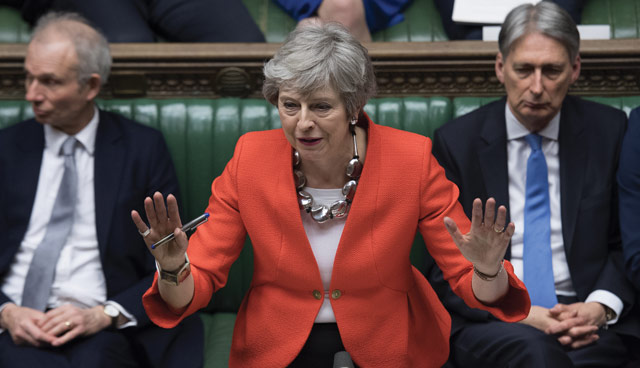All at sea

With the economic ramifications of a no deal scenario becoming clearer it now appears likely that the UK will seek an extension to its deadline to leave the EU. With a lack of consensus on the way forward, Brexit uncertainty could be much more long-term than once thought.
At the time of writing, British Prime Minister Theresa May has faced another humiliating defeat in the House of Commons on the withdrawal agreement but secured a majority vote to take a no deal scenario of the table.
The vote to remove no deal is simply for optics, with most agreeing that the vote does not reduce the potential for 29 March to pass without the UK agreeing a solution. May’s next step will be to raise a consensus for a delay to the Article 50 process, something that EU negotiators have appeared open to, and may be the catalyst that pushes the UK to produce a roadmap.
Delay of the Article 50 process has been long on the cards. It was suggested that even if May had secured a majority vote in parliament for the withdrawal agreement that some form of delay would be necessary given the amount of legislation that would need to be passed and Ireland has confirmed it would not block a delay in Britain leaving the EU.
Understandably the potential of delay was played down by the prime minister, recognising the tactical advantage of keeping pressure on MPs to fall in behind the withdrawal agreement. This had limited impact. 81 more MPs backed the withdrawal agreement the second time around but the 149-vote defeat still ranked as one of the largest ever in the commons.
Delay then would appear inevitable but this itself has challenges. Previous talk of an extension was mostly in the context of the UK having a plan, even if that plan was to leave without a deal. Presently, the UK has no such direction and have little credible grounds to attain the unanimous support needed from the EU 27.
Any hopes by Theresa May that she might be able to bring the withdrawal agreement back again for a third time appear to have gone given both the magnitude of the defeat and the fact that EU negotiators have indicated that no further concessions on the backstop are possible.
What the UK will offer to achieve an extension remains unclear. Options that are on the table include calling a general election, organising a second referendum or gaining support for the Norway model, yet there is no consensus for any of these approaches. The EU will want certainty but there will also be recognition that in granting an extension to Article 50, the likelihood that Brexit may never happen increases.
Initial delay, if granted, will be for a short-term period given the looming European elections. It’s unlikely that the UK will field candidates and so with the inauguration of new legislature legally required to take place on 2 July, there is potential for a new deadline of 1 July. However, this date is not as definitive as once thought. Lawyers in the EU are already working on concerns that the UK as a member state without representation could undermine the legitimacy of the assembly and impact on things like committee appointments and election of the Commission.
The EU do not want a no deal scenario and it appears unlikely that anyone in the UK will want to push the button that could bring about an 8 per cent fall in living standards, see blocked ports and threaten supply chains.
For these reasons alone there is the possibility that the UK’s exit from the EU could run and run.
“The EU do not want a no deal scenario and it appears unlikely that anyone in the UK will want to push the button that could bring about an 8 per cent fall in living standards.”
Tariffs
While the UK remaining aligned with the EU would signal good news for Ireland, the levels of uncertainty would not. With the 29 March fast approaching it’s likely that Ireland will lobby other member states to approve an extension to Article 50 given the economic impact of a no deal scenario. Latest figures by the Department of Finance indicate an over 4 per cent slowdown of GDP as the result of a hard Brexit and concerns have grown further after the UK unveiled its no deal tariff plan.
The plan indicates ambitions for the UK not to impose import tariffs on Irish goods into Northern Ireland and to around 87 per cent of imports to the rest of the UK. However, where tariffs will apply includes key products from the agri-food sector.
The UK Government announced tariffs and quotas on beef, lamb, pork, poultry and some diary. IFA president Joe Healy indicated that the outcome would be “disastrous” for the sector.
“Our most exposed sectors, particularly beef, simply will not survive the kind of tariffs being talked about. This would have a devastating effect in the rural economy,” he said.
“We export over 50 per cent of our beef to the UK. If this is subject to tariffs, it will be a direct hit of almost €800 million on the sector.”
Announcing the series of “strictly temporary, unilateral” measures, the British government said its priority would be to enter into discussions with the European Commission and the Irish Government to jointly agree long-term measures to avoid a hard border.
Under the temporary plans goods going from Ireland into the North will be subject to the same existing VAT and excise duty and small businesses trading across the border, not currently VAT-registered, would be able to report VAT online periodically without any new processes at the border.
Animals and animal products from countries outside the EU would have to enter Northern Ireland through a designated entry point. Regulated plant material from outside the EU and high-risk EU plant material will require certification and pre-notification. New import requirements would also apply to imports of endangered species and hazardous chemicals.
The UK has denied that differentiations in exports to the UK on the island will create the need for a sea border, insisting that instead “normal compliance and intelligence methods” will be used to detect any traders attempting to abuse the system.





